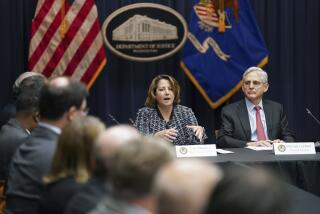Medical Test Firm’s Stock Price Plummets : Fraud: National Health Labs’ future is in doubt after it agrees to repay $110 million.
- Share via
SAN DIEGO — In a prospectus published last year, National Health Laboratories attributed its 24% average annual sales growth rate since 1986 to “quality and prompt service, aggressive and responsive sales management and detailed cost controls.”
Fraud, apparently, also played an important role in the impressive growth of the La Jolla-based medical test lab chain.
Now the company’s future seems very much in doubt. Its share priced plunged 24% Monday as investors digested National Health Labs’ agreement on Friday to refund $110 million to federal health insurance programs that the U.S. Department of Justice said were fraudulently billed for unnecessary blood tests.
The federal government’s success in forcing a record settlement on National Health Labs may also lead to a broader crackdown on the fast growing and lucrative medical testing industry where, some observers and law enforcement officials say, the same fraudulent practices are widespread. Such tactics, they say, account for a significant portion of the estimated $10 billion in Medicare and Medicaid fraud perpetrated annually.
Jack Dowden, former sales manager for a rival laboratory who blew the whistle on National Health Labs, said several companies are being investigated by the Justice Department, including his former employer, which Dowden declined to identify.
On Monday, U.S. Atty. William Braniff in San Diego said only that an unspecified number of other companies are being scrutinized by his office. Many of the details of Braniff’s case against National Health Labs lie in a sealed lawsuit on file at U.S. District Court in Los Angeles. The suit was filed by Dowden under the False Claims Act, the “whistle-blower’s law,” and joined by the U.S. attorney’s office.
The practice that National Health was accused of is common in the industry, said Scott Armstrong, executive director of Taxpayers Against Fraud, a Washington, D.C., watchdog group that contributed research to Dowden’s suit.
Federal authorities have moved in the past against fraud in the medical testing industry. Among the best-known cases of alleged medical insurance fraud were a series of federal charges against Michael and David Smushkevich for masterminding a $1-billion operation out of a set of mobile diagnostic vans dubbed “rolling labs.”
What makes the National Health Labs case unusual is that it involves a reputable, publicly traded company that was once part of the Revlon conglomerate taken over by financier Ronald O. Perelman in 1985. Since 1988, Perelman’s MacAndrews & Forbes Group has sold 80% of National Health Labs’ shares to the public. On Monday, the stock fell $5.50 to close at $17.25.
Company Chief Executive Robert E. Draper agreed to resign after pleading guilty to two criminal counts of submitting false claims to the federal insurance programs. He also agreed to pay a $500,000 fine and could go to jail.
Times staff writer Douglas P. Shuit contributed to this report.
More to Read
Inside the business of entertainment
The Wide Shot brings you news, analysis and insights on everything from streaming wars to production — and what it all means for the future.
You may occasionally receive promotional content from the Los Angeles Times.










